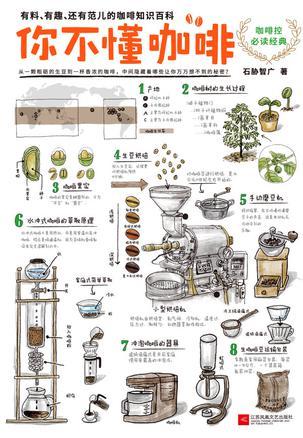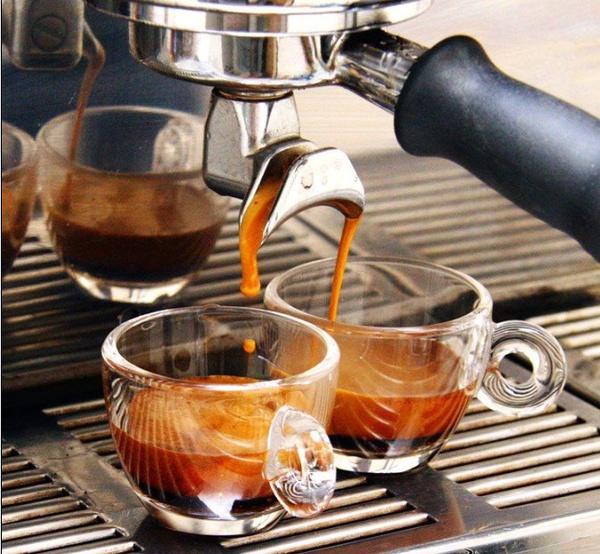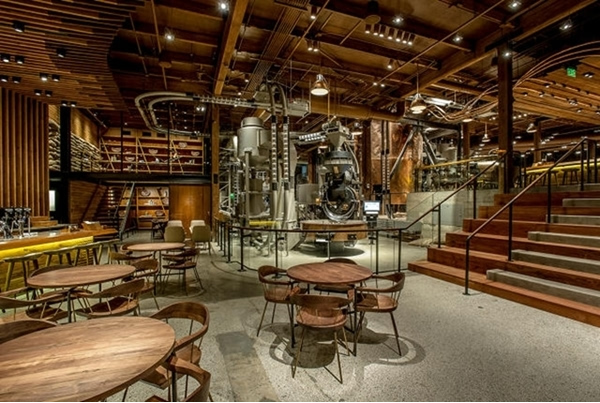The knowledge of a cup of coffee: "you don't understand coffee."

CCTV7 has a column called "Nongguang Heaven and Earth". The content of the program ranges from "Apple Tree Nutrition diagnosis and Scientific fertilization" to "how to choose breeding Boar"; from "Wolfberry processing" to "Landscape Bonsai production" all kinds of planting, breeding, processing and skills are available. I can't remember when, when I came home from work for dinner, or in the early morning of the occasional insomnia, I always changed to this program, and then stopped with the help of God until I finished watching it. Finally, I don't forget to be annoyed: what on earth is my hobby? How come you have the same taste as Shi Guangrong!
Later, I came across a post, which was probably the favorite TV program for white-collar workers in modern cities, in which "Nong Guang Heaven and Earth" actually ranked among the best. It was only then that I realized that "I am not alone in fighting" and that there are so many people who share the same "stink" as I do. Think about it carefully, having such a hobby is not water without a source. With curiosity about everything, want to explore the reasons of every plant around the world, and then enrich their own knowledge and life, this is the real reason.
Just like a small cup of coffee, even if we all drink it, we don't necessarily know what kind of soil a seed should choose, to go through a lot of selection and processing, to finally complete the extraction and put it in front of us. How many subtle details and strict technical control like chemical experiments are contained in it. As for how many people have worked hard in the whole process from the plantation to the coffee cup, it will be even more difficult for ordinary enthusiasts to pay attention to.
If I hadn't seen "you don't know coffee", I don't know how long it would take to answer the questions that always linger in my mind. Fortunately, this book can not only solve most of the questions, but also guide readers to discover the fun of coffee and explore the esoteric meaning of coffee like the Compass. So, for me, who has always wanted to know about coffee, this is definitely an excellent enlightening book. The gratifying thing is that it is not a shoddy fake guide, but a coffee control must-read encyclopedia of all the knowledge, skills and related content related to a cup of coffee.
The author of the book comes from Japan, a country that strives for excellence in everything, and its name is Shi Xiezhiguang (yes, the coffee control uncle in the book, who wears an experimental robe and smiles to us). As a lecturer of the Coffee Appraisal Committee, he is like a coffee fanatic, leading us, a group of tourists snooping around the coffee world, to visit and visit his paradise. Do not forget to personally brew a cup of strong coffee for everyone (of course, while explaining, while operating is necessary!).
The first three chapters of the book mainly introduce the simple common sense of coffee, the composition of coffee and how to brew delicious coffee. The fourth and fifth chapter is about the knowledge of coffee processing and cultivation, selection, circulation and varieties. The writing style is cordial and simple, and the content structure is reasonable, which takes good care of the interest of the readers. Coupled with lovely hand-drawn illustrations, vivid and interesting, very vividly shows the original boring and abstract chemical principles.
For example, the explanation of different brewing methods of coffee in Q24 uses the example of the race between the tortoise and the hare, comparing the sour taste to a fast rabbit and the bitter taste to a slow tortoise, giving readers a vivid and intuitive understanding of the ratio of sour to bitter taste in coffee. Of course, there are Miss Arabica and Sister Kanefra throughout.
One of the biggest feelings of reading the whole book is that a cup of coffee contains much more than what we can see. Every little detail about coffee affects the taste of coffee. From the selection of coffee beans to the level of water temperature, from coffee-making utensils to the posture of pouring water, and so on, even the choice of filter paper used in conjunction with the filter rack also requires special attention (if the filter paper tastes strong, it will also interfere with the aroma of coffee!). In this way, it takes extra care to brew a cup of coffee that suits the drinker's taste. No wonder people who really know coffee (or think they know coffee) are very stylish.
Although the title "you don't know Coffee" is really exciting to readers, it means that they don't understand, at least most people don't know it as well as the author himself. And people who really want to "understand very well" will not just ask 87 questions. In this sense, at the advanced level, such readings naturally belong to a relatively basic level and are more suitable for interest in coffee. Sincere people who want to learn to understand and enjoy the fun and beauty of tasting a cup of coffee.
It is commendable that the author of this book does not condescend to be an expert, but teaches what he knows in an objective, fair, down-to-earth and accurate language, telling stories about his experience and gains over the past decade or so. While paying attention to the coffee itself, we do not forget to remind the environmental protection and health problems, and give some suggestions very kindly, which is full of humanistic feelings.
Coffee is fashion, coffee is life, coffee is a kind of culture, but also a kind of art. Its seed is far from home, but its fruit has spread to the whole world; its charm is great, but it is all dissolved in one cup. After watching these 87 coffee-related questions, we will certainly have a deeper understanding of this lovely plant, and naturally take it to a higher level in the field of coffee culture. However, if I want to really know more about coffee and culture, I think I need to learn more patiently and deeply.
_ _ _
Let's explode three more points:
? The cover of the book is unconventional, hand-painted with fresh and lovely coffee color, condensing the contents of the book into one page, rich, exquisite, and easy to deepen impression.
Every time I pick up this book, I can't help looking at the pictures and words on the cover. It's a little obsessive-compulsive. Can I tell anyone about this?!)
? The text inside is all brown! It's brown! Can you imagine, when talking about coffee, the illustrations are all cute brown and brown words! It looks really extraordinary.
Why can't you add some coffee flavor to the page? In this way the reader will drool on the book.
? There is a noun explanation at the end of the book, which makes it convenient for readers to quickly find professional terms and grasp key words.
I can't remember it if I read it only once. Can you all remember?
(source of this article: slow time)
Important Notice :
前街咖啡 FrontStreet Coffee has moved to new addredd:
FrontStreet Coffee Address: 315,Donghua East Road,GuangZhou
Tel:020 38364473
- Prev

China Internet thinking Cafe Top100
Among the cafes throughout the city, Wen / Mo has a relatively special kind of storefront, which is not only a place for business talks or rest, but also closely related to entrepreneurship. This kind of Internet cafe is also called mass creation space, as its name implies, it is the place where many people discuss to start a business. In other words, these cafes provide a platform for entrepreneurs to communicate and discuss.
- Next

14 extraordinary Starbucks Fujian in the world are on the list!
Do you like coffee? do you like Starbucks coffee? Starbucks opened its first store in Park Market in Seattle in 1971 and began to operate the coffee bean business. So far Starbucks has opened 23187 stores in 64 countries. In January 1999, Chinese mainland opened its first store in Beijing International Trade.
Related
- The ceremony is full! Starbucks starts to cut the ribbon at a complimentary coffee station?!
- A whole Michelin meal?! Lucky launches the new "Small Butter Apple Crispy Latte"
- Three tips for adjusting espresso on rainy days! Quickly find the right water temperature, powder, and grinding ratio for espresso!
- How much hot water does it take to brew hanging ear coffee? How does it taste best? Can hot water from the water dispenser be used to make ear drip coffee?
- What grade does Jamaica Blue Mountain No. 1 coffee belong to and how to drink it better? What is the highest grade of Blue Mountain coffee for coffee aristocrats?
- What are the flavor characteristics of the world-famous coffee Blue Mountain No. 1 Golden Mantelin? What are the characteristics of deep-roasted bitter coffee?
- Can I make coffee a second time in an Italian hand-brewed mocha pot? Why can't coffee be brewed several times like tea leaves?
- Hand-brewed coffee flows with a knife and a tornado. How to brew it? What is the proportion of grinding water and water temperature divided into?
- What is the difference between Indonesian Sumatra Mantinin coffee and gold Mantinin? How to distinguish between real and fake golden Mantelin coffee?
- What does bypass mean in coffee? Why can hand-brewed coffee and water make it better?

